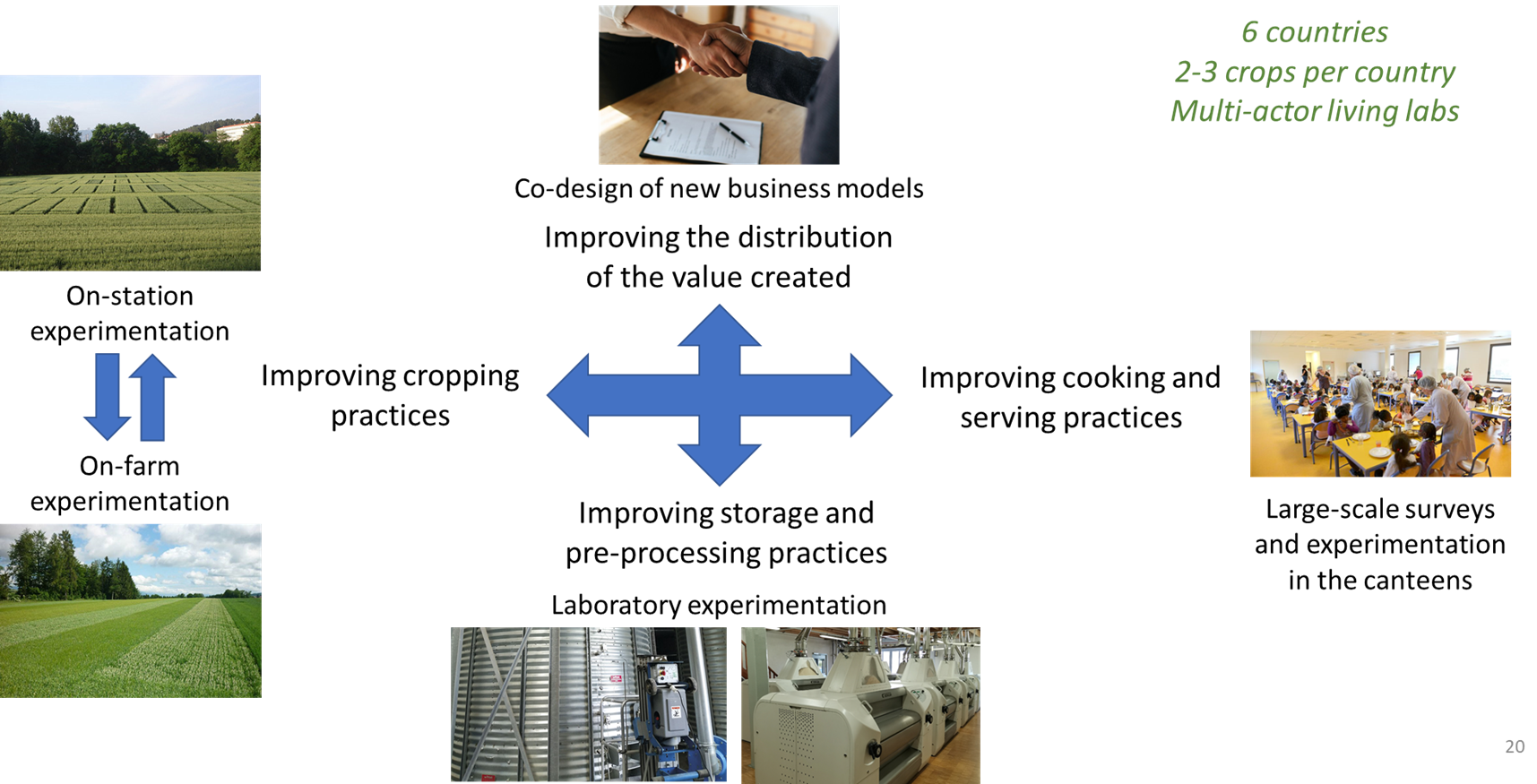CropCat
Upscaling minor crops with institutional catering
Duration: 05/2025 - 04/2028 (tbc)
Summary
To transform the food system towards agroecology, diversified farming systems are to be developed. Such systems require crop diversification which can rely on multiple options (e.g. intercropping), one of which being the introduction of minor crops in cropping systems. This is a grand challenge given the current European land use dominated by a small number of crops. Farmers lack locally-relevant agronomic knowledge to cultivate minor crops and overall, they lack outlets for minor crop food products due to low consumption habits. Given the significant impact of institutional catering on production and consumption practices, it can serve as a powerful lever to promote the development of minor crops. Such a development requires jointly addressing cultivation, storage, pre-processing, cooking and consumption issues.
The CropCat project thus aims at developing the cultivation of minor crops in farmers’ fields and the consumption of related products in canteen guest plates following a co-innovation and interdisciplinary approach. To do so, we will (i) establish guidelines to run living labs, where innovations on minor crops will be developed across stages of the value chain, and assess the outcomes induced, including co-learning; (ii) characterize the agroecological performance of minor crops and improve cultivation techniques to close yield gaps, and promote the delivery of other ecosystem services; (iii) develop low-tech pre-processing technologies to prevent metabolic changes during storage and preserve the sanitary and nutritional quality of products derived from minor crops thus limiting spoilage; (iv) define a framework to capture the value of minor crop food products into new business models based on institutional catering; (v) develop a set of nudges to consumers’ choices of dishes based on minor crop food products to ensure their acceptance; (vi) identify policy instruments and governance frameworks supporting the development of minor crops from farmers’ fields to canteen plates through procurement arrangements.
The project will build on 6 living labs in 6 European countries (Fig. 1) gathering stakeholders concerned with minor crops from farm to fork: farmers, advisors, representatives of agrifood industries, catering companies, researchers, cooks and public agents (Fig. 2). The living labs are located on a North-South gradient covering different soil-climate conditions suited to diverse minor crop species. Each living lab will work on a few (2-4) locally relevant minor crop species matching farmers’ and cooks’ constraints and objectives (e.g. chickpea, carob and millet in Spain, chickpea, lentil and buckwheat in Germany). All living labs are embedded in contexts where (i) farmers are motivated to grow new crops to diversify their land use and test adaptations against challenges such as climate change, and (ii) public authorities are increasingly considering to improve the sustainability of institutional catering. As a result, new value chains are being considered.
Source: Guillaume Martin
Source: Guillaume Martin
Considering cultivation, storage, pre-processing, cooking and consumption issues together during problem formulation and co-design will allow addressing the synergies and antagonisms between technological, technical, institutional and organizational innovations across the value chain and the identification of operational solutions. We will thereby contribute to spread agroecology across Europe, by supporting land use and diet diversity and more sustainable farming, food procurement and human diets.
Source: Guillaume Martin
Coordinator
Guillaume Martin
National Research Institute for Agriculture, Food and Environment (INRAe-AGIR), FRANCE
Email: guillaume.martin@inrae.fr
Source: Guillaume Martin
Partners
Moritz Reckling - Leibniz Centre for Agricultural Landscape Research (ZALF), GERMANY
Ane Kirstine Aare - Roskilde University (RUC), DENMARK
Maria RiveraMendez - University of Évora (UEVORA), PORTUGAL
Anna Maria Häring - Eberswalde University for Sustainable Development (ESD), GERMANY
Eve-Anna Sanner - Centre Régional de Recherche et d’Expérimentation en Agriculture Biologique au service de l'innovation en Occitanie et dans le Grand Sud (CREABio), FRANCE
Lise Pujos - Ecocert France SAS, FRANCE
Claire Georges - Les Bios du Gers, FRANCE
Gloria Isabel Guzmán Casado - Pablo de Olavide University (UPO), SPAIN
Romualdo Benitez Rodríguez - La Retornable, SPAIN
Emanuele Blasi - University of Tuscia (UNITUS), ITALY
Valérie Lullien Pellerin - National Research Institute for Agriculture, Food and Environment (INRAe-IATE), FRANCE
Bente Kramer Møller - City of Aarhus, DENMARK
Source photos banner:
Field: Photo by Viktor Smoliak on Unsplash







